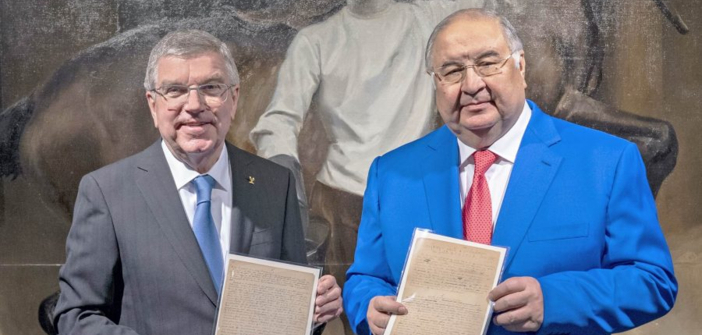The story is anything but ordinary. It also doesn’t lack a certain irony. At a time when Russia is threatened with exclusion from the Olympic movement for a four-year purgatory, one of its most influential sports leaders, and undoubtedly the wealthiest, has personally written a page in the history of Olympism.
Alisher Usmanov, 66 years old, one of the richest men in Russia (his fortune was estimated at $14.4 billion in 2015), president of the International Fencing Federation (FIE) since 2018, has donated to the Olympic Museum in Lausanne a relic over a century old, handwritten by Pierre de Coubertin himself: the original Olympic manifesto of 1892, where the French baron advocated for the return of the Olympic Games.
The handover ceremony of the precious document took place in Lausanne. Alisher Usmanov entrusted it with careful gestures to Thomas Bach, who did not hesitate to describe the moment as historic.
Let’s rewind a bit. Last December, the original Olympic manifesto was prominently featured in the program of an auction organized by Sotheby’s in New York. According to expert estimates, the document could fetch $1 million or a bit more. But the bids quickly soared. Three international buyers vied for the manifesto. The bidding battle lasted 12 minutes.
In the end, the 14-page manifesto was sold for a record sum of $8.8 million. It became the most expensive sports memorabilia in history, overthrowing a New York Yankees baseball jersey worn by Babe Ruth, bought last year for $5.64 million.
At the time, the news caused a sensation. Above all, it sparked intrigue. Who could be the mysterious buyer willing to pay over $8 million for a bundle of 14 sheets of vellum paper, written in French with sepia ink, on the back of blank registration forms for the 1889 International Congress on Physical Education?
Several names circulated. Qatar was mentioned. The IOC was too. Alisher Usmanov remained silent.
Evidently, the Russian billionaire decided that the time for secrecy was over. On Monday, he traveled to Lausanne to personally hand over the manifesto to the IOC.
“Today we are witnessing history,” suggested Thomas Bach as he received the precious document with a very solemn air. “We are witnessing this historical document, the manuscript of the speech that laid the philosophical foundations of the Olympic movement. We are witnessing a historic moment with the return of this manuscript to its Olympic home, the place where it belongs.”
More reserved in his remarks, Alisher Usmanov was very pragmatic. “I believe the Olympic Museum is the most appropriate place to preserve this invaluable manuscript,” the Russian leader stated. Not untrue.
According to the IOC, several original pages of the manifesto, featuring enigmatic revisions, will be on display soon at the Olympic Museum. The complete document will then join the permanent exhibition.


